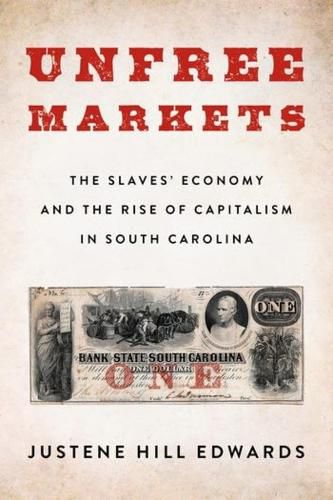Readings Newsletter
Become a Readings Member to make your shopping experience even easier.
Sign in or sign up for free!
You’re not far away from qualifying for FREE standard shipping within Australia
You’ve qualified for FREE standard shipping within Australia
The cart is loading…






The everyday lives of enslaved people were filled with the backbreaking tasks that their enslavers forced them to complete. But in spare moments, they found time in which to earn money and obtain goods for themselves. Enslaved people led vibrant economic lives, cultivating produce and raising livestock to trade and sell. They exchanged goods with nonslaveholding whites and even sold products to their enslavers. Did these pursuits represent a modicum of freedom in the interstices of slavery, or did they further shackle enslaved people by other means?
Justene Hill Edwards illuminates the inner workings of the slaves’ economy and the strategies that enslaved people used to participate in the market. Focusing on South Carolina from the colonial period to the Civil War, she examines how the capitalist development of slavery influenced the economic lives of enslaved people. Hill Edwards demonstrates that as enslavers embraced increasingly capitalist principles, enslaved people slowly lost their economic autonomy. As slaveholders became more profit-oriented in the nineteenth century, they also sought to control enslaved people’s economic behavior and capture the gains. Despite enslaved people’s aptitude for enterprise, their market activities came to be one more part of the violent and exploitative regime that shaped their lives. Drawing on wide-ranging archival research to expand our understanding of racial capitalism, Unfree Markets shows the limits of the connection between economic activity and freedom.
$9.00 standard shipping within Australia
FREE standard shipping within Australia for orders over $100.00
Express & International shipping calculated at checkout
The everyday lives of enslaved people were filled with the backbreaking tasks that their enslavers forced them to complete. But in spare moments, they found time in which to earn money and obtain goods for themselves. Enslaved people led vibrant economic lives, cultivating produce and raising livestock to trade and sell. They exchanged goods with nonslaveholding whites and even sold products to their enslavers. Did these pursuits represent a modicum of freedom in the interstices of slavery, or did they further shackle enslaved people by other means?
Justene Hill Edwards illuminates the inner workings of the slaves’ economy and the strategies that enslaved people used to participate in the market. Focusing on South Carolina from the colonial period to the Civil War, she examines how the capitalist development of slavery influenced the economic lives of enslaved people. Hill Edwards demonstrates that as enslavers embraced increasingly capitalist principles, enslaved people slowly lost their economic autonomy. As slaveholders became more profit-oriented in the nineteenth century, they also sought to control enslaved people’s economic behavior and capture the gains. Despite enslaved people’s aptitude for enterprise, their market activities came to be one more part of the violent and exploitative regime that shaped their lives. Drawing on wide-ranging archival research to expand our understanding of racial capitalism, Unfree Markets shows the limits of the connection between economic activity and freedom.